#Cambodia elections
Text
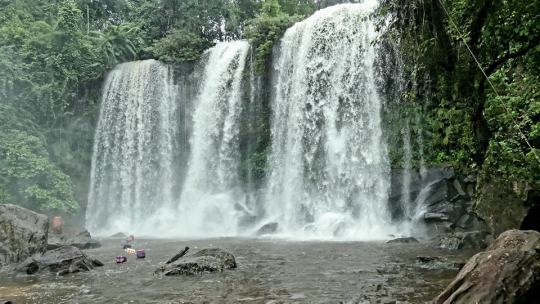
siem reap taxi driver , cambodia taxi driver , phnom penh taxi driver , taxi driver in siem reap , taxi driver in Cambodia , taxi driver from siem reap to Phnom penh
Hello Dear Gentle Traveler & Gentle Tourist ! My name is Same Sa Vat I am a local private tuk tuk driver , Car taxi driver , Mini Van include English Tour Guide in Siem Reap and Private taxi driver in Cambodia , If you Need Private Car taxi for Option private Tour or Adventure tours with transfer off from Each city to City in Cambodia ...My Private taxi driver Cambodia such you need ..... angkor best driver & best car taxi driver in Cambodia , Best Taxi driver in siem reap
My Driving Partner : siem reap taxi driver , taxi driver in phnom penh , taxi driver kep , taxi driver in Kampot , taxi driver in shinaoukville , taxi driver in Battambang , taxi driver in Kampong Cham & Kampong Thom ..
City Transfer & Transport : siem reap , phnom penh , battambang , Thailand Border , Kep and Kaport , Koh Kong province , Vietnam Border , Kratie Province , Kampong Cham , Kampong Thom , Preah vihear province , Udomeanchay , Banteay Mean Chay , Mondulkiri Province and Rattanakiri province
Best Option Tour Siem Reap : Phnom kulen Mountain waterfall , Floating Village at Kampong Kleang village , Kampong Pluk floating Village , Peareang Floating Village , Beng Mealea Temple , Koh ker temple , Prasat Preah Vihear temple , Prasat Banteay Chmar Temple , Prasat Sambo Prei Kok temple and Prasat Preah Khan Kampong Svay temple , Pol pot or Ta mok House ( Confirmed Tours Can start from Siem Reap City )
#travelblogger#angkorwattemple#cambodia#tripadvisor#travel#traveling#angkorwat#asian#angkorthom#thailand#canada#california#malaysia#indonesia#vietnam#hanoi#cambodia elections#cambodia travel#cambodia private taxi driver#cambodia 2023
0 notes
Text
Cambodia's Friday Women are fighting for justice, with their husbands and sons in jail ahead of a 'democratic charade' election.
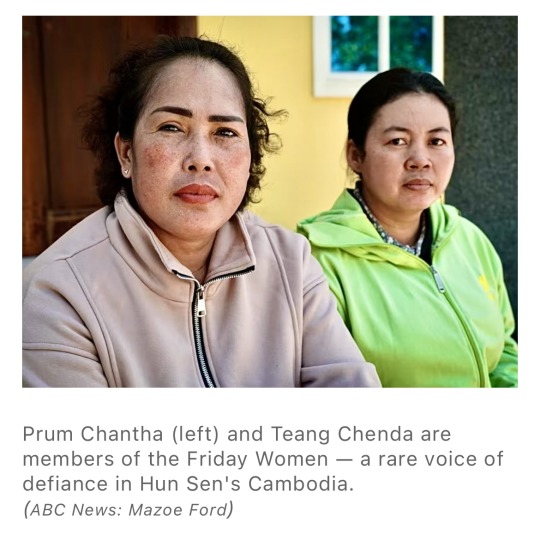
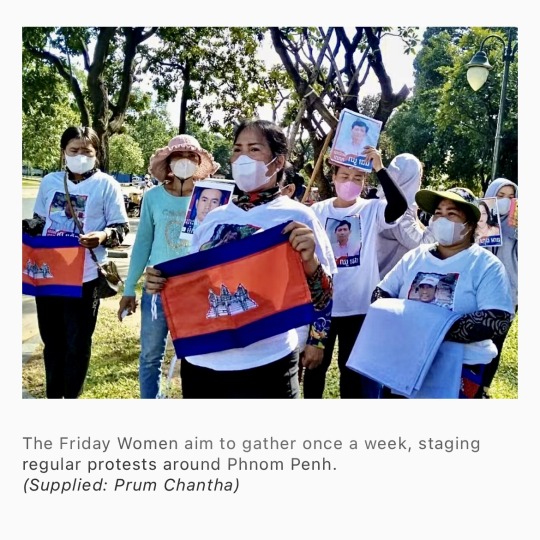
Cambodia’s only credible opposition party disqualified from running in elections.
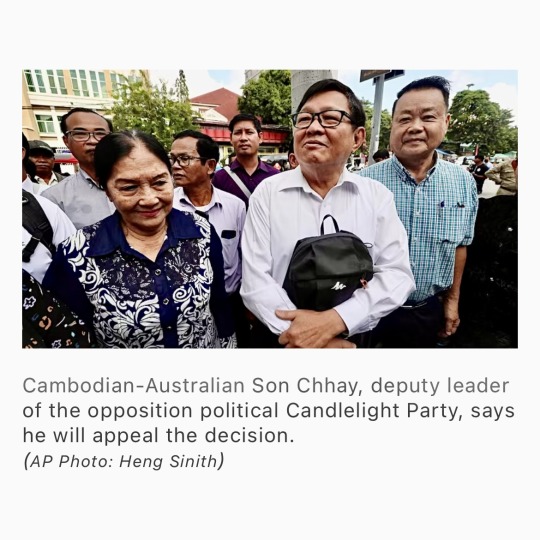
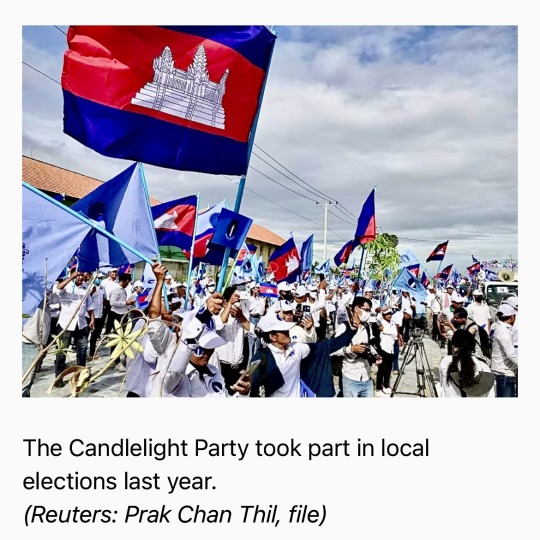
Cambodia’s strongman faces an unlosable election. But will he still run the country?
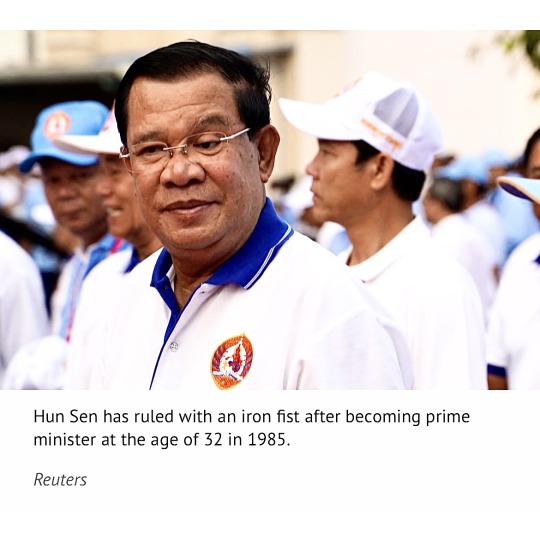
Cambodian Australians ask the government not to recognise ‘sham’ Cambodian elections.
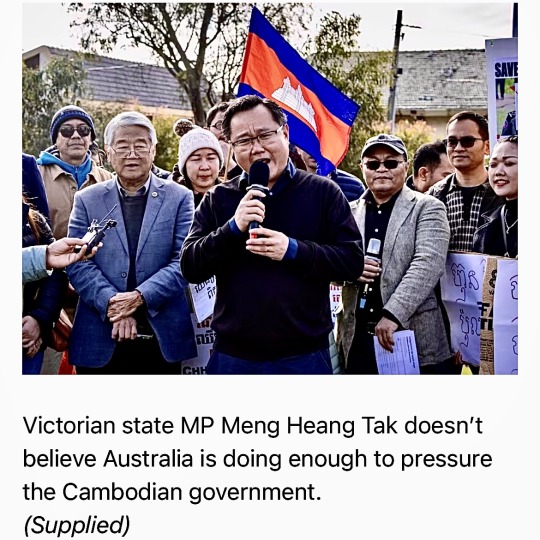
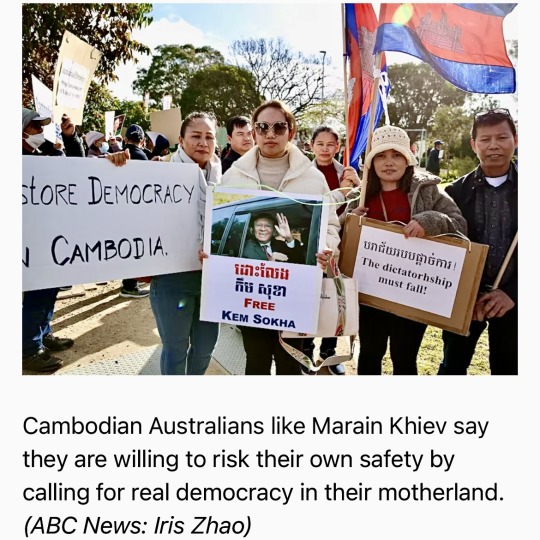
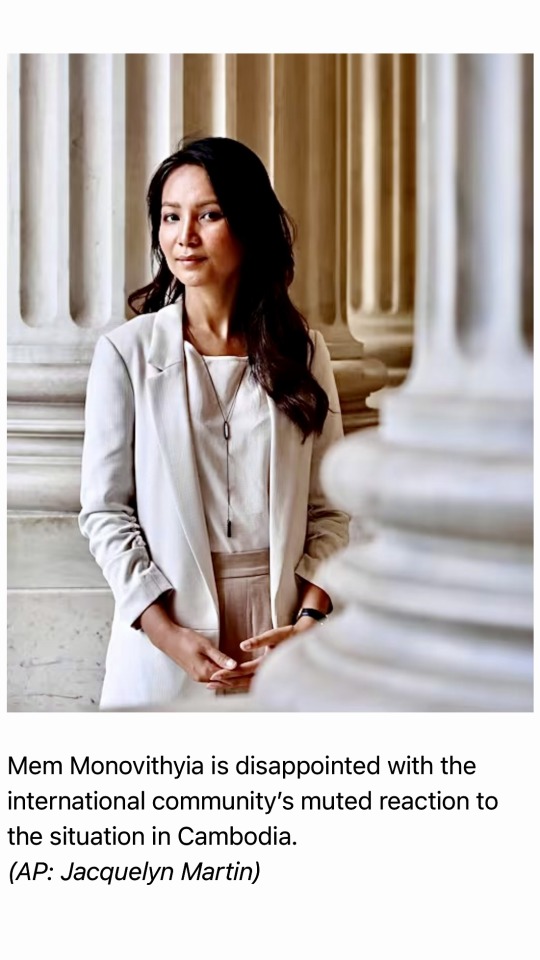
Cambodian leader's son Hun Manet set to take reins of power — but will he bring change?
ABC News
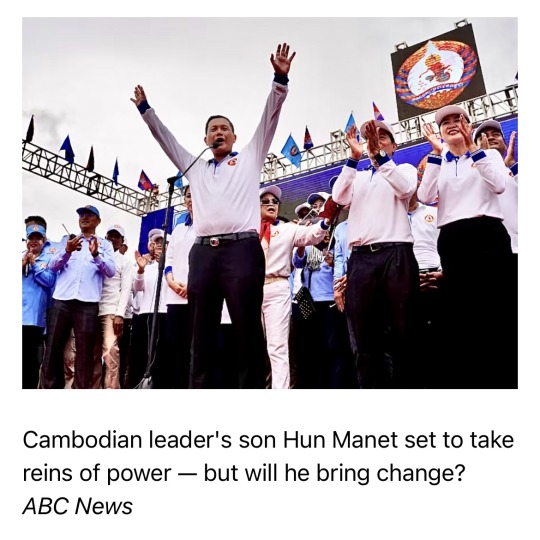
#Kampuchea#Democratic Kampuchea#Kampuchea elections#Cambodia#Cambodia’s Friday Women#Cambodia elections#Hun Sen#Hun Manet
0 notes
Text
Undeterred by the pouring rain, a long convoy of motorbikes carrying cheering, flag-waving supporters of Cambodia's ruling party revved their engines in preparation for their triumphant final rally in downtown Phnom Penh.
People dutifully lined the road as far as you could see, party stickers on their cheeks, the sky-blue hats and shirts they had been given to wear getting steadily wetter.
Perched on the back of a truck, Hun Manet, the 45-year-old eldest son of Prime Minister Hun Sen, greeted the crowds proclaiming that only the Cambodian People's Party (CPP) was capable of leading the country.
Indeed, his father had made sure that the CPP was the only party which could possibly win the election.
Hun Sen, 70, has run Cambodia in his trademark pugnacious style for 38 years: first in a Vietnam-installed communist regime, then under a UN-installed multi-party system, and more recently as an increasingly intolerant autocrat.
The only party now capable of challenging his rule, the Candlelight Party, was banned from the election on a technicality in May. The remaining 17 parties allowed to contest it were too small or too little-known to pose a threat.
A few hours after the polls closed, the CPP claimed the expected landslide, with a turnout of more than 80%. There were quite high levels of spoiled ballot papers in some polling stations: that was probably the only safe way voters could show their support for the opposition.
With Hun Manet expected to succeed his father within weeks of the vote, in a long-prepared transfer of power, this felt more like a coronation than an election.
"I don't think we can even call it a sham election," says Mu Sochua, an exiled former minister and member of the CNRP, another opposition party banned by the Cambodian authorities in 2017.
"We should call it a 'selection', for Hun Sen to make sure that his party will select his son as the next prime minister of Cambodia, to continue the dynasty of the Hun family."
Yet there were signs of nervousness in the CPP before the vote. New laws were hurriedly passed criminalising any encouragement of ballot-spoiling or a boycott. Several Candlelight members were arrested.
"Why was the CPP campaigning so hard, against no one in this election with no real opposition?" asks Ou Virak, founder of the Cambodian think tank Future Forum.
"They knew they would win the election - that was an easy outcome for them. But winning legitimacy is much more difficult.
"They need to keep weakening the opposition, but at the same time, they also need to satisfy the people, so there is no repeat of previous setbacks and disruptions, like street protests."
Hun Sen is one of Asia's great survivors, a wily, street-smart politician who has time and again outmanoeuvred his opponents. He has skilfully played off China, by far the biggest foreign investor these days, against the US and Europe, which are trying to claw back lost influence in the region.
But he has come close to losing elections in the past. He is still vulnerable, to rival factions in his own ruling party, and to any sudden downturn in the Cambodian economy which could sour public opinion against him. So as he prepares for a once-in-a-generation leadership change, he is trying to cement his legacy.
A short drive north of the capital, a 33m-high concrete-and-marble monolith was built recently, which he calls the Win-Win memorial.
Its massive base is covered in carved stone reliefs, echoing Cambodia's greatest historic monument, Angkor Wat.
They depict Hun Sen's flight from Khmer Rouge-ruled Cambodia to Vietnam in 1977, his triumphant return with the invading Vietnamese army in 1979, and his eventual deal with the last of the Khmer Rouge leaders in 1998 that ended the long civil war - his win-win for the Cambodian people.
Delivering peace and prosperity has long been Hun Sen's main claim to legitimacy. Since 1998, Cambodia has had one of the world's fastest-growing economies, albeit from a very low base.
But it is a model of growth which has concentrated wealth in the hands of a few families - the number of ultra-luxury cars on the roads of such a low-income country is jarring. It has encouraged rapacious exploitation of Cambodia's natural resources and it has left many ordinary people feeling that they are not winning under Mr Sen.
Prak Sopheap lives with her family at the back of an engine repair shop, squeezed between the main road and one of the many shallow lakes in the low-lying land outside Phnom Penh. They have been there for 25 years, fishing and cultivating vegetables on the lake.
Today, though, much of the lake has been filled with rubble by a property developer and Ms Sopheap's family have been ordered to leave.
She showed me a document from the local council, confirming how long she had lived there, and another document, a summons to court on a charge of illegally occupying state land. She feels powerless and angry - and she is not alone.
Land disputes are among the most incendiary grievances in Cambodia. All property deeds were destroyed in the Khmer Rouge revolution.
Since the end of the civil war, millions of hectares have been allocated for commercial development, a lucrative arrangement which has made many politicians and businesses allied to Hun Sen very rich.
The courts very rarely rule against these powerful interests. Transparency International ranks Cambodia as 150th out of 180 countries for corruption: in the Asia-Pacific region, only Myanmar and North Korea rank lower.
"Hun Sen always talks about his 'win-win policy'", says Ms Sopheap. "But we feel it is he alone who wins. We cannot feel at peace, as we now face eviction. We, the real Cambodian people, who live on this land, are suffering in the name of development."
Those who have tried to campaign against land grabs and evictions have been harassed, beaten and jailed, as have trade unionists and supporters of opposition parties. I asked Ms Sopheap how she would vote in this election. "Who can I choose?" she asked. "Who can protect me?"
Half of those eligible to vote are under 35 years old. The CPP has tried attracting them by having Hun Manet and other younger party leaders run this year's campaign, with a slick social media strategy.
But as most Cambodians have no memory of war or the Khmer Rouge, Ly Chandravuth, a 23-year-old law graduate and environmental activist, says the old CPP campaign points are no longer persuasive.
"Hun Manet's biggest challenge will be that my generation is very different from previous ones, who were traumatised by the Khmer Rouge," he says.
"Since I was a child, I have watched the ruling party reminding us of that tragedy, telling us that as they brought peace, we should support them. But that argument is less and less effective. Every time the ruling party brings it up, the young generation mocks them, because they have been repeating it for 30 years."
Can Hun Manet modify the rough-house, sometimes thuggish leadership style of his father to a softer and more subtle kind of rule? Despite his Western education, his years heading the army and his long apprenticeship, he has never yet held a top political office.
With him, other "princeling" sons of Hun Sen's contemporaries, such as Defence Minister Tea Banh and Interior Minister Sar Keng, are also expected to replace their fathers in the cabinet - a dynastic shift which keeps the levers of power with the same families, but in less experienced hands. The next few years could be a delicate, even dangerous time for Cambodia.
13 notes
·
View notes
Text
🗣️🙏🗣️ CAMBODIA MENTIONED!! 🇰🇭🪷 WHAT THE FUCK IS A DEMOCRATICALLY ELECTED GOVERNMENT!??!! 🇰🇭🗣️ ARRGGHHHHHHHHHHHHHHHHHHHH 🗣️🗣️🪷🙏
#sorry i had to do it - also biking in CAMBODIA? 😭😂😂 I mean you can but you're better off on motorcycle#we had a protest recently at the Victorian Parliament (in Aus) against the lack of action against the authoritarian ruler of Cambodia#he handed power to his son after 30+ ruling which is INSANE but expected - the Australian gov is being pushed to act due to the relations#also also Australia and NZ are two countries that took in many MANY Cambodian refugees during the genocidal rule of Pol Pot so...yeah#my grandparents - uncles aunties - and parents left a country during it's time of a genocidal fascist ruler and now its an authoritarian one#i hope one day that we can all go back when its a gov thats ppl elected and actually wants the country and ppl to live happier lives#anyways im venting in here my bad - but yeah some fun info#sherlock & co#sherlock and co#liveblogging#sherlock#sherlock holmes#john watson#goalhanger podcasts
5 notes
·
View notes
Text
Cambodia leader to step down
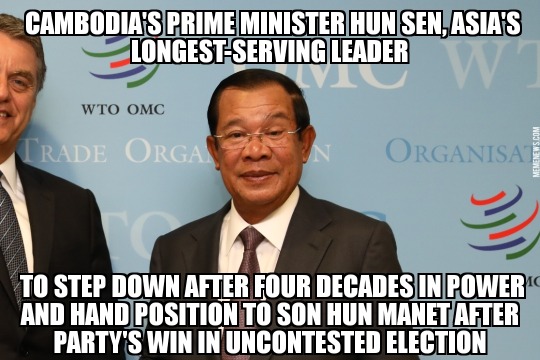
View On WordPress
2 notes
·
View notes
Text
0 notes
Text
Thailand and Cambodia, two neighboring countries in Southeast Asia, are preparing to hold general elections this year. Thailand is scheduled to hold its polls on May 14, while Cambodia will follow on July 23.
In Thailand, the military-dominated government led by the Palang Pracharath Party (PPRP) has been employing authoritarian tactics against dissidents, including the use of arbitrary detention and lese-majeste charges. The country experienced mass anti-government protests in 2020-2021 that were fueled by the military’s continued hold on power and the monarchy’s involvement in governance, but the movement has since lost its momentum.
In Cambodia, the Cambodian People’s Party (CPP) led by Prime Minister Hun Sen has dominated the political system for nearly four decades. Since the 2018 elections, the parliament has been fully controlled by the ruling party following the court-ordered dissolution of the opposition Cambodia National Rescue Party (CNRP). In recent years, Hun Sen’s government has intensified its repression of the opposition, civil society activists, and independent media with intimidation and politically motivated prosecutions.
Thailand has recently changed its electoral system by increasing the number of constituencies from 350 to 400, reducing the number of party-list seats from 150 to 100, and reintroducing the system in which each voter will cast two ballots – one for a constituency candidate and one for a political party. These changes are expected to benefit large parties like the PPRP and the opposition Pheu Thai Party, but they may hurt smaller parties that rely on party list seats.
Pheu Thai’s Paetongtarn Shinawatra, the younger daughter of former premier Thaksin Shinawatra, has emerged as the most popular choice for prime minister. according to the latest opinion poll. Meanwhile, incumbent Prayut Chan-o-cha only ranks third. Although Pheu Thai is expected to win big, forming the government remains a challenge because the prime minister will be elected by both houses of parliament. Given that all 250 members of the Senate are selected by the military, the military-backed candidate theoretically only needs 126 seats from the House of Representatives to be elected prime minister.
Enjoying this article? Click here to subscribe for full access. Just $5 a month.
However, even if Pheu Thai and other opposition parties manage to form a coalition government after the election, the threat of a military coup looms large. Thailand has a history of frequent shifts between democratic elections and military takeovers since transitioning to a constitutional monarchy 90 years ago, and these threats continue to cast a shadow over the country’s political landscape.
In Cambodia, dozens of opposition leaders who were banned from politics following the dissolution of the CNRP have undergone “political rehabilitation” and regained their political rights, leading to the rise of the reactivated opposition Candlelight Party. The Candlelight Party managed to garner one-fifth of the popular vote in its debut commune elections last year. Compared to the 2017 commune elections, where the CNRP won 44 percent of the popular vote, the Candlelight Party’s achievement cannot be regarded as a significant electoral threat to the CPP’s rule.
While Thailand has seen the emergence of influential opposition leaders, such as Pita Limjaroenrat of the Move Forward Party and Paetongtarn Shinawatra of the Pheu Thai Party, Cambodia has yet to produce a similar figurehead for its opposition movement since CNRP President Sam Rainsy was forced into exile in 2015 and his deputy Kem Sokha was arrested in 2017. Despite this, the opposition in Cambodia continues to face intimidation, harassment, and politically motivated prosecution by the CPP. The uncertainty surrounding Hun Sen’s succession plan, which involves passing power to his son Hun Manet, has led the regime to intensify measures to suppress political opposition and independent media organizations. In the first quarter of this year alone, there have been incidents of judicial harassment against Candlelight Party leaders, the shutdown of independent media outlet VOD, and the sentencing of Kem Sokha to 27 years imprisonment on charges of treason.
Against such a backdrop, threats against the opposition and civil society are expected to continue, and genuine and legitimate elections will not be possible. Unlike the elections in Thailand where some level of uncertainty exists, it is already certain that the CPP will continue its rule after the July election. However, the CPP may consider allocating some seats to the opposition to dispel Cambodia’s image as a one-party state. The CPP itself anticipates winning a majority of the seats with a projected 104, and the remaining 21 seats could potentially be secured by the Candlelight Party.
History has shown that a united and well-organized opposition is a crucial requirement to overcome authoritarianism, especially under the first-past-the-post electoral system. This was evident in Malaysia’s 2018 and 2022 elections. However, in Thailand, the opposition remains fragmented, which gives the ruling military proxy party an advantage. In Cambodia, although some opposition parties have attempted to merge to challenge the ruling CPP, no opposition has emerged strong enough yet to mount a formidable challenge to CPP’s continued rule.
Both Thailand and Cambodia have a shared history of undemocratically dissolving opposition parties. For instance, in Thailand, the Thai Raksa Chart Party and the Future Forward Party were dissolved in 2019 and 2020, respectively, while in Cambodia, the CNRP suffered the same fate in 2017. There have been concerns that these countries may make similar moves again in response to growing opposition support, but there is currently no indication that either country will resort to such tactics, at least not until the upcoming elections.
The victory of the opposition in Thailand would be a major step toward the country’s democratic advancement, which has been hindered by military dictatorship since 2014. It would also convey an encouraging message to countries in the region that are struggling to transition to democracy, such as Cambodia and Myanmar.
If Thailand’s PPRP and Cambodia’s CPP were to win their respective elections, it could lead to further consolidation of power of authoritarian parties in both countries. This could potentially lead to a further erosion of democratic institutions and human rights, with far-reaching consequences beyond these two countries. Such an outcome will only encourage other authoritarian governments to tighten their grip on power and suppress dissent. The developments of these two elections, therefore, warrant close watch.
0 notes
Link
0 notes
Text
Cambodian court convicts lawyer, dozens of others of treason
Cambodian court convicts lawyer, dozens of others of treason
PHNOM PENH, Cambodia (AP) — A Cambodian-American lawyer and dozens of members of a now-dissolved opposition party were convicted of treason Tuesday in a trial that is part of efforts to tame opposition to the long-running rule of Prime Minister Hun Sen.
Lawyer Theary Seng and most of the other defendants were charged over a failed attempt by the leader of the defunct Cambodia National Rescue…
View On WordPress
#Asia Pacific#Cambodia#Elections#Government and politics#Health#Hun Sen#National elections#Phnom Penh#Sam Rainsy#World News
0 notes
Text
for those of you who may be wondering "why is everyone so happy Henry Kissinger died" or "who even is Henry Kissinger" here's a brief explanation: He's a war criminal responsible for the death of millions to the point he's often compared to Hitler because he killed so many innocent people. He was secretary of state under Nixon and a national security advisor under Gerald Ford. He is directly responsible for the reason the Vietnam war went on 7 years longer than it was supposed to. He was responsible for Laos being bombed 270 million times, making it the most bombed country ever. He's also responsible for carpet bombing Cambodia despite there being literally no reason to. Also he overthrew Chile's first female president and replaced her with the dictator Augusto Pinochet who killed thousands. And this is literally just the tip of the iceberg.
Edit: I've been told that the president overthrown in Chile was Salvador Allende, who was the first democratically elected socialist president and that the first female president was Michelle Bachelet in 2006. Sorry for my mistake.
#henry kissinger#us politics#crab rave#thank god#rest in piss#I'm sure anthony bourdain is kicking his ass in hell right now
960 notes
·
View notes
Text
Stevenson's army, June 6
Stevenson’s army, June 6
On this 78th anniversary of the allied invasion of France, YouTube has a short cut from a newsreel report later shown in US theaters and the audio of CBS radio’s reporting that day, supplemented with newsreel footage.
The Biden foreign policy team is mostly people he has known a long time. [BTW, the most collegial and leak-free team was Bush 41’s] They show consensus and cooperation but little…
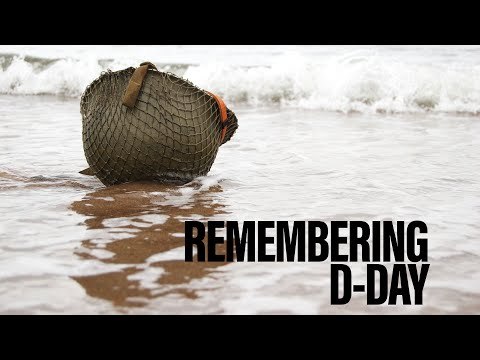
View On WordPress
0 notes
Text
Cambodian Opposition Rises From the Ashes Ahead of Local Elections | World News
Cambodian Opposition Rises From the Ashes Ahead of Local Elections | World News
PHNOM PENH (Reuters) – Speaking from the back of a pickup truck decked out with campaign posters and loudspeakers, veteran politician Son Chhay is determined to convince voters that democracy in Cambodia is not dead.
With the newly created Candlelight Party, he and other activists are contesting upcoming local elections, hoping to resurrect political opposition to what has become a one-party…
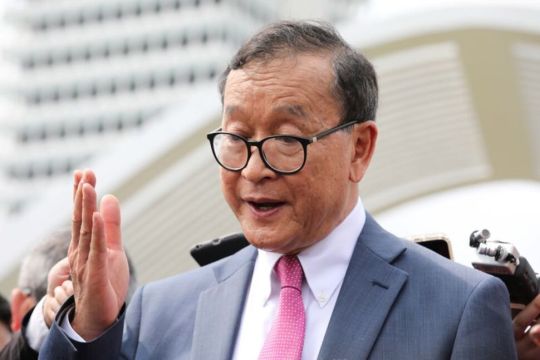
View On WordPress
#ahead#Ashes#Cambodia#Cambodian#Collections: World#Elections#Local#News#opposition#Reuters#rises#World#World News
0 notes
Link
A year after Nobel Peace Prize winner Jose Ramos-Horta reclaimed the presidency, other familiar faces are hitting the campaign trail in the lead-up to a crucial parliamentary poll, which will determine who forms government.
Not for the first time, the poll has been cast as a showdown between independence hero Xanana Gusmao’s National Congress for Timorese Reconstruction (CNRT) and Mari Alkatiri’s Fretilin. There is a great deal at stake.
In the backdrop is the country’s unsteady reliance on natural resources, a plight highlighted by the projection that its petroleum-based sovereign wealth fund, which pays for more than 80 per cent of state spending, will run dry in a decade.
Gusmao, the former guerrilla fighter and Timor-Leste’s first president, is seeking to return his party to power, championing his long-held vision of piping liquified natural gas from the $50 billion Greater Sunrise fields to the country’s south coast in a bid to secure its economic prosperity.
It’s a cause that has also been taken up with gusto by Ramos-Horta since he became president again with the backing of Gusmao and CNRT, by hinting that the country could turn to China if Australia and commercial partner Woodside Energy insists on processing gas in Darwin instead.
The potential geopolitical ramifications mean Canberra will be watching the May 21 election particularly closely.
Polls are also looming large elsewhere in South-East Asia.
Thailand is gearing up to vote next month, Cambodia will follow in July while in Malaysia, the tenuous grip of Anwar Ibrahim’s coalition government may be put to the test by the results of half a dozen coming state contests.
The pace is also starting to pick up in Indonesia’s 2024 presidential race, with a likely field of three candidates taking shape.
There are asterisks of varying size that can be applied to some of this year’s elections.
In Thailand, for instance, the game is stacked against opposition groups attempting to overcome pro-army parties before a ballot has even been cast.
Pheu Thai, the party associated with former prime minister Thaksin Shinawatra and fronted by his 36-year-old daughter, Paetongtarn, is predicted to capture the most seats in the 500-member parliament on May 14.
But the appointment of a 250-strong, military-aligned senate that also has a say on the leadership makes it an uneven playing field from the outset. That’s without even considering the spectre of a military coup, a far from uncommon occurrence in Thailand when the armed forces don’t get their way.
As for Cambodia, opposition voices have been drowned out by intimidation and prosecution to such an extent that Hun Sen’s ruling party, which holds all 125 seats in parliament, doesn’t face a real challenge.
There is also an election on the cards this year in junta-controlled Myanmar, but it’s widely anticipated to be a sham.
In such a field, Timor-Leste certainly stands out from the pack.
“This is the most vibrant democracy in South-East Asia by a long way,” said Swinburne University of Technology professor Michael Leach. “The Timorese fought for their democracy in a way that many other countries did not, and they value it accordingly.”
While the old guard again take centre stage, young people will have a big role in the outcome. The median age in Timor-Leste is 21 and roughly 15 per cent of an estimated 900,000 registered voters will be first timers. Importantly, it is also the first time people born after the restoration of independence in 2002 will be old enough to vote. They must choose representatives for all 65 seats in parliament, with a 33-seat majority needed to govern.
They will do so with issues such as high youth unemployment, poverty and poor infrastructure and services still major problems, despite the billions of dollars in revenue collected from oil and gas in the past two decades.
“On the streets of Dili the Timorese experience is increasingly defined by a blend of pride and frustration,” said University of Adelaide anthropologist Michael Rose.
“It’s a busy place of big families, small farms and deep roots, but although work is rarely hard to find, a regular salary is.
“Many seek to go abroad, but without a functioning economy at home, the money they remit back into the family networks can only make so much difference.”
Age dictates this may well be the last campaign for Timor-Leste’s perennial protagonists, including 76-year-old Gusmao, who is revered for his struggle against Indonesian occupation.
But with their country’s economic future on the line, it is the generation who have grown up in peace and who will have to deal with the decisions made today.
6 notes
·
View notes
Text
I’ve seen a few people, mostly non-American, who don’t know who Henry Kissinger is or what he did. So your local history student and nerd is going to try to give a quick summary of the main atrocities he committed.
-Role in the Vietnam War: this is the first and biggest reason most people have for hating Kissinger. He unnecessarily extended and expanded the war prolonging the already frivolous conflict. He purposefully delayed negotiations. He approved large scale carpet bombings done with the use of B-52 bombs killed thousands to millions of innocent civilians. The Christmas Bombing was an intense, focused bombing that caused large civilian deaths in a short period of time. He engaged in negotiations with the North Vietnamese often without permission or knowledge from the US government. He was the National Security Advisor and overall had much knowledge about 1) how useless the war was 2) the travesties happening to both the North Vietnamese and South, as well as America’s own soldiers.
-Secret Bombing and Invasion in Cambodia: Kissinger (and Nixon) lead secret bombing campaigns in Cambodia aimed to destroy North Vietnamese trails and routes that ran through the country. Cambodia originally pursued neutrality in the war. Its citizens were not involved.
-Invasion and Bombing of Laos: Laos also held North Vietnamese routes, so Kissinger led Operation Lam Son which was a full scale invasion supplied with American air power and weapons. Not that it would matter, but this invasion did little to interrupt the trade routes. The North Vietnamese, made up of people who lived and knew the landscape of Vietnam, were able to adapt and find new routes. There was also secret bombings carried out in Laos, authorized by Kissinger, aimed to destroy the Ho Chi Minh trail, which, once again, wasn’t disrupted and just took innocent civilian lives in Laos. Laos also remained neutral in the Vietnam War. They were not involved, yet they were punished.
-Involvement in the Bangladesh Liberation War: this was a war between Bangladesh and Pakistan. Kissinger remained in a close relationship with Pakistan which, by now, was known to be committing horrendous human rights abuses, including large scale killings of the Bangladeshis. In fact, Kissinger and America provided funding for them. America was aligned in the first place because of bullshit Cold War alliances.
-Supporting and funding a dictator over an elected president: Chile had elected a *gasp* socialist president that really made Kissinger piss his pants. Project FUBELT, directly under Kissinger’s guidance, initiated covert actions to undermine and prevent the socialist President, Salvador Allende, from rising to power. Financial support was provided to anti-Allende groups and would eventually provided support to a military coup who would kill Allende. The leader of the coup, Augusto Pinochet, would then assume power and take rule an authoritarian government and become a dictator for 17 years. Under his rule, torture and executions were carried out against political dissidents and others. This wasn’t a secret.
-Supported the brutal invasion of East Timor: Indonesia would invade and occupy East Timor in 1975. Kissinger and Nixon had knowledge of the invasion beforehand and provided military support despite the knowledge of human rights abuses already taking place in East Timor by the Indonesians, abuses often using US weapons. Massacres, forced displacement, suppression of political dissents, torture, sexual abuse, restrictions of religious and cultural practices, and scorched earth policies are just some examples.
To my knowledge, these are usually the largest reasons cited, but please add more if I’m wrong. There are also lesser known atrocities either supported or funded by Kissinger, many taking place in Africa, that I thoroughly implore you to read about. Please correct any inaccurate things I said.
559 notes
·
View notes
Text
This is Red Scare propaganda in 2023.
Did you know that a few days ago Democrats and Republicans voted to join sides against socialism and "socialist policies"(good welfare programs)?
According to Axios:
More than half of House Democrats sided with Republicans on Thursday in voting for a GOP resolution denouncing socialism. [...]
• The resolution denounces “socialism in all its forms” and opposes “the implementation of socialist policies in the United States of America.”
• A total of 106 Democrats voted for the resolution, while 86 voted against it and another 14 voted "present. "
What they're saying:
• “This [was] very much about politics and political messaging, and you saw that with some of the people voting present,” said Rep. Annie Kuster (D-N.H.), the chair of the centrist New Democrat Coalition, which supported the resolution.
• Kuster said leadership was attentive to swing-district members' needs: "It was very much open-door conversations this week ... just conversations about where our members were coming from and how they felt about this. They had strong feelings about this."
What we're hearing:
• House Republican campaign operatives are already sharpening their knives against Democrats who voted against the resolution.
• "It’s certainly a potent hit we’re excited about," Jack Pandol, a spokesperson for the National Republican Congressional Committee, told Axios. "If you can’t vote to denounce the horrors of socialism, yes, we will be letting your constituents know about it."
The other side:
Rep. Pramila Jayapal (D-Wash.), the chair of the Progressive Caucus, told Axios that her faction recommended its members vote against the resolution and she advised colleagues “however you vote on this bill, they’re going to use it against you, so it doesn’t really matter.”
• Jayapal also argued the bill's sweeping rebuke of socialism conflates historical despots with modern entitlement programs and Nordic social democracies: "They're trying to tie those successful [welfare] programs ... to [former ruler of Cambodia] Pol Pot."
So Democrats and Republicans can unite over what's important to them: Capitalism.
More than half of Democrats in office right now would side with Republicans against your well being. Over half of them.
What we're witnessing is an abuse of power that Only serves to keep Democrats and Republicans as power players in politics.
Coincidentally this comes after a historic rise in union membership, calls for higher wages, protests, and it's also right before presidential candidates have started campaigning!
They didn't sign a resolution like this over Trump supporters literally attacking capitol hill. They haven't made Any reform or agreement that could stop another Trump from winning an election again either. They literally expose people to right-wing candidates on purpose just to help themselves win elections.
But this? Good welfare programs and left-wing ideas being spread before an election? That was a priority. That needed to be stopped. That's dangerous.
Let me ask y'all something: if you feel comfortable showing regular people a bunch of far-right ideas on primetime tv but you wouldn't show them any left-wing ideas at all... Wouldn't that make you right-wing? At the very least you've chosen a side, haven't you?

Democrats don't want to challenge the status quo. Apparently that's the ONE thing they can agree on with Republicans about. That's it's staying here and not going anywhere. That's what this tells me.
If you caught yourself thinking I'll vote for a democrat,at least they won't make things worse please consider that keeping things awful on purpose absolutely counts as making things worse. And also being comfortable with far-right ideology but not far-left ideology means Democrats are closer to being fascists than fighting fascism.
This year spend some time researching candidates that are listed as independent, green party, socialists, or communists. The only people worth entertaining are people who actually care and actually want to change things for the better.
#mutual aid#direct action#leftist#lgbt#capitalism#biden#2024 voting#usa politics#socialism#communism#anarchism#indigenous#liberal#democrats#progressives#socdem#ancom#acab#eat the rich#current events#news#2024 elections#presidential election#primary election#2023
889 notes
·
View notes
Text
In light of the recent Supreme Court ruling on student debt forgiveness in Biden v. Nebraska, it seems it might be useful to revisit why American students have so much student debt.
Ironically, it all dates back to Reagan's and the Republicans' decision to cut back on funding for public colleges and universities in order to avoid the possibility of having an "educated proletariat."
So it isn't surprising that is is Republicans who were opposed to any government debt forgiveness for student loans. THEY DON'T WANT TO HAVE EDUCATED CITIZENS. The poorly educated are much easier to manipulate and control.
In 1970, Ronald Reagan was running for reelection as governor of California. He had first won in 1966 with confrontational rhetoric toward the University of California public college system and executed confrontational policies when in office. In May 1970, Reagan had shut down all 28 UC and Cal State campuses in the midst of student protests against the Vietnam War and the U.S. bombing of Cambodia. On October 29, less than a week before the election, his education adviser Roger A. Freeman spoke at a press conference to defend him.
Freeman’s remarks were reported the next day in the San Francisco Chronicle under the headline “Professor Sees Peril in Education.” According to the Chronicle article, Freeman said, “We are in danger of producing an educated proletariat. … That’s dynamite! We have to be selective on who we allow [to go to college].”
“If not,” Freeman continued, “we will have a large number of highly trained and unemployed people.”
#ronald reagan#public higher education#educated proletariat#roger freeman#student debt#supreme court#student loan forgiveness#biden v nebraska
592 notes
·
View notes